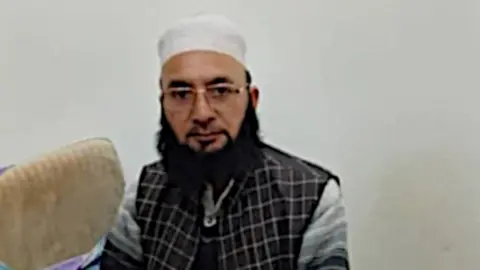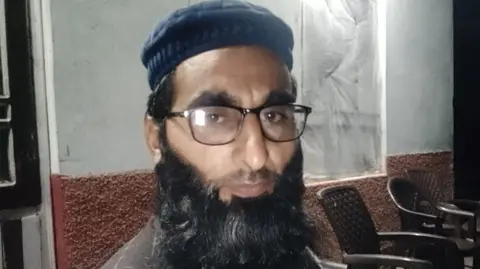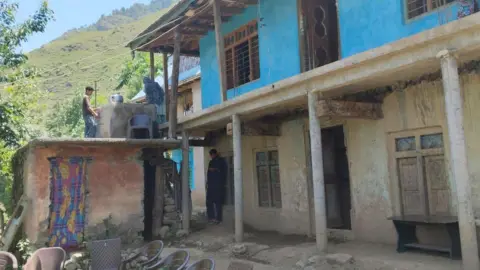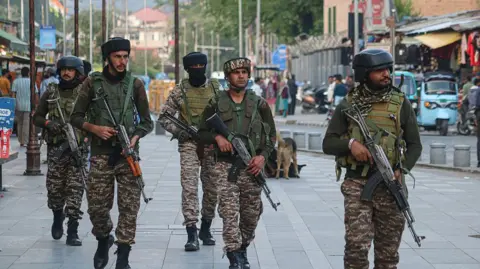An Indian teacher was killed - then he got falsely labelled a "terrorist"
 Farooq Ahmed
Farooq AhmedFarooq Ahmed still bristles with anger when he talks about his brother's death.
Mohammad Iqbal, a resident of Poonch city in Indian-administered Kashmir, died in cross-border shelling on 7 May, the morning after India launched a series of air strikes in Pakistan and Pakistan-administered Kashmir in retaliation to a militant attack in the town of Pahalgam that killed 26 people. Pakistan has denied having any role in the attack.
Mr Ahmed says that Iqbal died where he had worked for more than two decades - Zia-ul-Uloom, a madrassa, or a religious centre focused on Islamic teachings, in Poonch.
But his death, it turned out, was just the beginning of the family's troubles.
As the news spread, several media channels falsely accused Iqbal of being a terrorist, following which the police put out a statement refuting the claim.
"My brother was a teacher but they saw his beard and skullcap and branded him a terrorist," Mr Ahmed says.
"It was like having salt rubbed into our wounds. We had lost Iqbal and then the media defamed him. The dead can't defend themselves."
Indian officials say that a total of 16 people, including Iqbal, were killed in the cross-border shelling during the four-day military conflict that broke out between India and Pakistan following the airstrikes.
Pakistan has claimed 40 civilian deaths, though, it remains unclear how many of these were directly caused by the shelling.
The two nuclear-armed countries have shared a tense relationship for decades, as both administer the Himalayan region of Kashmir in part, but claim it in full.
They have fought three wars over Kashmir since independence from Britain in 1947 and came back from the brink of another one earlier this month.
 Farooq Ahmed
Farooq AhmedBut as the military conflict escalated, another battle played out on social media - a disinformation war of claims and counterclaims that circulated online and on TV.
Just like rumours about Iqbal's identity, other misleading and inaccurate information also found its way into some mainstream news channels and websites.
This included claims such as India having destroyed Pakistan's Karachi port, which was later debunked by the Indian government.
Some of the other fabrications were harder to spot, like an AI-generated video of a Pakistan army general claiming that his country had lost two aircraft in combat.
"The scale of misinformation and fact-free assertions being broadcast by the media was shocking," says Manisha Pande, managing editor at Newslaundry, an independent news platform.
She notes that while a degree of sensationalism is expected as channels compete for viewership, "the jingoistic and irresponsible coverage" of the conflict was unprecedented in its intensity — and unlike anything she had witnessed before.
No one knows this better than Mr Ahmed.
"I don't know where news channels got the information about my brother from," Mr Ahmed says.
"Who did they speak to? What kind of evidence did they have that my brother was a terrorist?" he asks.
 Farooq Ahmed
Farooq AhmedWeeks later, the family is still reeling from the tragedy.
Mr Ahmed says that on 7 May, his brother left home for the madrassa in the morning as usual, but it was his body that returned home. By noon, they had buried him in a nearby cemetery.
For some time, the family had no idea about the misinformation that was being shared by some news outlets. They were busy performing Iqbal's last rites.
It was only hours later that a relative received a WhatsApp forward - a video clip of a prominent news channel claiming that the Indian army had killed a terrorist, with Iqbal's photo flashing on the screen.
"We were shocked. Soon, we began getting more calls from people asking us what was going on and why was the media calling Iqbal a terrorist," Mr Ahmed says.
The claim was shared by some prominent channels, including Zee News, ABP and News18. The BBC has reached out to the channels for comment.
One channel claimed that Iqbal was killed in an "Indian strike on a terrorist camp" in Pakistan-administered Kashmir, and that he was a terrorist with Pakistan-based terror group Lashkar-e-Taiba.
"Our family members have been staying in Poonch for generations. How can they say my brother was living in Pakistan? They [the media] should be ashamed," Mr Ahmed says.
 Getty Images
Getty ImagesThe accusation against Iqbal was circulated so widely and swiftly that on 8 May, the Poonch police put out a statement, clarifying that Iqbal had died in cross-border shelling in the madrasa.
"Poonch Police strongly refutes such false narratives. The deceased, Maulana Mohd Iqbal, was a respected religious figure in the local community and had no affiliation with any terror outfit," the statement said, adding that legal action would be taken against any media outlet or individual who circulated the fake news.
But for Mr Ahmed, the statement was too little too late.
"By then, the false claim would've already reached millions of people in India," he says.
He adds that except for one channel, News18, no one else had publicly apologised to him or their viewers for the mistake.
Mr Ahmed says he wants to take legal action against the channels, but the process would have to wait as the family is struggling to make ends meet.
Iqbal is survived by his two wives and eight children. He was the only earning member in his family.
Mr Ahmed says that the compensation given by the government, which amounts to a few million rupees, will last only for a year or two and they must start planning for the future now.
"The whole family depended on my brother. He was a quiet and gentle man who loved teaching children," Mr Ahmed says.
"But who's going to tell this to the world? For many people, my brother is still a terrorist whose killing is justified. How will they understand our pain?"
Additional reporting by Auqib Javeed in Srinagar in Indian-administered Kashmir
Follow BBC News India on Instagram, YouTube, Twitter and Facebook.
